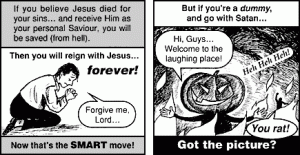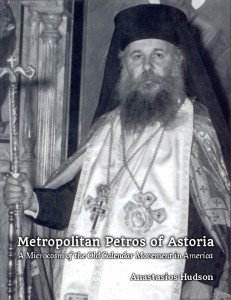Thoughts on Halloween
I don’t celebrate Halloween, out of obedience to my bishop and because my conscience does not permit me to engage in anything that makes light of the dark powers (which, when I was involved with occultic things as a teenager, I witnessed with my own eyes).
That being said, a few points:
1) A lot of the anti-Halloween stuff is derived from Protestant Fundamentalist nonsense, and should not be taken seriously or used in Orthodox arguments against Halloween. We really don’t know what Druids did, what their religion was like, or what the pagans of the British Isles really did on Samhein, apart from a few unreliable testimonies of the Romans, who deliberately fabricated and hyped them up to justify their annexation of Britain and destruction of the British people’s traditional social structure. Recall that the Romans were just as pagan as the British were, but had an “enlightened” form of paganism, so the more inchoate and natural paganism of the Druids and Celts was seen as backward and uncivilized. But the real fact is that the Druids were powerful in that society, and their power needed to be broken.
2) Things like trick-or-treat have their antecedents in Christian people going door to door and getting soul cakes and praying for the dead members of the household. To Protestant Fundamentalists, this is paganism (because they are unable to nuance spiritual and religious practices they disagree with, instead oversimplifying and lumping things together). What I am saying is that even if you are a Protestant who does not believe in praying for the dead, you can state your objections based on the Christian sources, and respond to the Christian and Jewish sources we use to defend the practice, without saying incorrectly that we are engaging in paganism. So by adopting the line that trick or treat is some kind of pagan demonic thing whereby if you didn’t get what you wanted, you would engage in mischief, is to perpetuate a Fundamental error which in its essence is anti-Orthodox (and anti-Catholic).
So I still don’t think we should be celebrating Halloween, but let’s refrain from celebrating it for mature spiritual reasons, and not nonsensical fantasy reasons which, once our kids realize are untrue, could cause them to question other foundational tenets of our faith.
3) If you are Orthodox and are going to do it anyway, which I know some of you will based on seeing your Facebook pictures, then at least have the decency to:
a) Not dress your kids up like demons, witches, devils, ghosts, skeletons, vampires, or zombies.
b) Not post your pictures with public settings or for all friends–use the “custom” privacy setting Facebook provides to hide it from your fellow Orthodox Christians who might be scandalized or bothered.
I’m not judging anyone and I have my own sins which perhaps I have been too open with online in the past; we all are on a journey and trying to grow in Christ. I just want people to be careful. I don’t want people to believe in hyped up Fundamentalist distortions, nor do I want people to give in to a temptation to view the dark powers as fun–because from personal experience, I can say they are scary as &*$%.

Anastasios Hudson is an Orthodox Christian author, speaker, and web developer living in Reston, Virginia. He is the author of Metropolitan Petros of Astoria: A Microcosm of the Old Calendar Movement in America (2014). Your purchase of this book, which is available at the low price of 7.99 (print) and 4.99 (eBook) will help him support his family! His personal website is AnastasiosHudson.com and his Facebook page is located here.




Anastasios,
Thank you for your thoughtful treatment on the issue of Halloween. I only wish this post had been released in the weeks preceding the event for the edification and benefit of any Orthodox or other parents on the fence regarding it. Your insight and personal experiences are valuable and can be a beacon to those a bit lost in sea of information and dis-information all around us. That said, I don’t envy today’s Orthodox convert parents and the stressful challenges of having to teach their children how to love Christ first amongst so many passions competing for attention.
Our nation’s love affair with consumerism is enchanting at best and sinfully seductive at worst. The soi-distant “holiday”, Halloween, is a 7.4 billion dollar industry in this country alone and more money is spent on adult costuming than children’s and that trend is steadily increasing. As adults are spending more and more time at leisure, ostensibly with the growing reliance upon automated technology, we are seeing a culture in which infantilism is perennially perpetuated. Halloween is a perfect storm of a society of grown up babies masquerading as spooks and spirits, goblins and ghosts, patrol officers and pirates and hookers and hijackers. I have seen otherwise respectable men out on the town dressed as Osama bin Laden; seemingly conservative professional women moonlighting as prostitutes and everything in between on this night of socially-sanctioned sin.
I am in agreement with your assessment on the murky origins of Celtic religious practices and Druidism. I do believe there exists more detritus from these ancient traditions than you may be aware of which has been spackled together by modern pagan reconstructionists. Regardless, it is a largely broken tradition and most of its origins credulity is speculative at best.
Playing with “secret” powers and “forbidden” knowledge has become fairly innocuous in our modern paganesque culture. A surge of renewed interest in the dark arts, to include the multifarious genres of ethnic pagan religions such as Druidism, Scottish witchcraft, Norse religions, Asatru, shamanism, animism, Wicca, et al has turned a generation of young adults against Christianity and further fueled these sanctions by the exploitation of what possibly began as a Christian folk expression for the benefit of a consumerism-gone-mad culture. That’s some irony there.
I am a bit surprised you didn’t include the Latin American celebration of Dia de Los Muertos, which encompasses three successive days of hybrid celebrations of and for the dead as experienced through an unusual melange of Catholic and indigenous religious practices. Certainly, that festival has made an increased impact on American culture year by year as witnessed by the popular “sugar skull” face painting. Without question, the phenomenon known as Halloween has morphed into a behemoth of universal superstitious and pagan components wedded with sensationalistic popular junk culture and slickly packaged for mass consumption by a sugar-addicted society. The bitten fruit from the tree of knowledge of good and evil is preserved well under a caramel coating. Trick or treat.
Colmcille,
I wrote the article as a Facebook post off-the-cuff, then decided to clean it up a bit and make it a blog post. That is a good point about El Día de los Muertos. However, I would emphasize that the macabre practices one finds in Mexico now are unlike what happens in other parts of Latin America. Last year on the day, I went with Pilar and the kids to Pilar’s brother’s (he was my best friend) grave, and we prayed for his soul. Obviously, as an Orthodox, I did not recognize that as All Souls’ Day, but I went for cultural reasons, to try and tie in prayer for the dead with something that would resonate with them. I didn’t go this year due to scheduling conflicts, but will go and pray for him on his anniversary of repose, God-willing, which is November 19.
Thanks, as always, for your comments.
Anastasios
“…could cause them to question other foundational tenets of our faith.”
Yes, because we can’t have ANY questioning. Wouldn’t want any close examination or critical thinking going on. Might lead to the collapse of a whole cult built on mythology. Notwithstanding the fact that Hallowe’en has become an entirely secular event during which, for approximately three whole hours on the last evening of October, kids put on silly costumes and go meet the neighbors in order to get miniature versions of junky candy, all whilst being entirely and utterly DISinterested in the origins of such an activity, and completely NOT ascribing any religious value to it whatsoever.
Frankly, your diatribe comes across as nothing more than an elaborately embroidered excuse for being too cheap to give out any goodies at the door. And your website reeks of “closeted gay boy” BTW.
I’m all for critical thinking, as is any serious Orthodox Christian. Many of us arrived where we are after examining the facts and the historical evidence.
My post was directed against Fundamentalistic Protestant misrepresentations of the historical evidence, and was pretty much against the idea that we should delve into the allegedly pagan origins of the festival, since there really is no historical evidence. I also point out some of the Christian origins of trick-or-treating. My argument is against celebrating the holiday based on some of the contact with the dark powers in our own lives and experiences–things which happened to me personally as a child and then as a young adult.
I’d love to know why you a) think my website reeks of “closeted gay boy” b) why you care what my sexual preferences are in the first place, if you are so “open minded”? But for the record, I am only interested in women, and have two kids and three stepkids.
“Frankly, your diatribe comes across as nothing more than an elaborately embroidered excuse for being too cheap to give out any goodies at the door. And your website reeks of “closeted gay boy” BTW”
I think he’s trying to say your website is *fabulous*!
“I’d love to know why you a) think my website reeks of “closeted gay boy” b) why you care what my sexual preferences are in the first place, if you are so “open minded”?”
-Because ad hominem attacks preclude one from having to use one’s intellect to defend one’s position.
Lord have mercy.
“A lot of the anti-Halloween stuff is derived from Protestant Fundamentalist nonsense, and should not be taken seriously or used in Orthodox arguments against Halloween.”
Where is the evidence for the claim? Often, the Protestants are more in touch with modern scholarship and research. It is the Orthodox who wallow in ignorance, antiquated ideas, superstition, and superficial scholarship. The facts and sources speak for themselves, regardless of who is making the claim. Anyone who defends Halloween in any way, is lacking in spiritual discernment and the testing of spirits.
Halloween has absolutely nothing to do with Christianity. Watch this video by a world famous expert on the occult. He shows the occultic origins of Halloween.